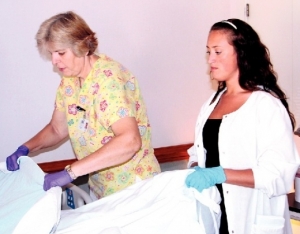Heartfelt health care
By Laura Collins
Published in News on August 23, 2010 1:46 PM

News-Argus/BOBBY WILLIAMS
Frances Jones, left, a nursing assistant at Kitty Askins Hospice Center, helps turn a patient as reporter Laura Collins looks on. Jones and other hospice workers go from room to room checking on patients, helping keep them comfortable.
The Job: In-patient facility employee
The Company: Kitty Askins Hospice Center
The Location: Goldsboro
When I walked into Kitty Askins, I instantly struggled to remember how I knew all these people.
"Well hey there, honey," the nurse at the front desk said.
I seem to have a hard time remembering names with faces. I've just always been bad at it for as long as I can remember. Early on I developed what I call the "man/girl technique" to help me along the way. Based on who I see that I recognize but don't recall their name I respond with "Hey. man," or "Hey, girl," to avoid an embarrassing moment and to buy some time until my brain decides to start working.
I got such a warm reception when I walked into Kitty Askins, I assumed I met the nurses several times before.
"Well, hello there, Sugar, how are you today?" another nurse asked. My brain started going a mile a minute trying to remember her name.
"Hi," one said when she passed by. "How are you?" she asked with a huge smile.
I was getting worried. But then someone else walked in, and he got the same, friendly, I've-known-you-forever reception.
It was then that I started to understand what everyone had been telling me about Kitty Askins and its staff. Even before going to work there for a day, I had heard what a difference Kitty Askins makes in the lives of local families, how understanding and caring the staff was. And I was seeing it in action.
When I arrived I started by helping Debbie Denlinger, hospice in-patient facility manager. She gave me the rundown of the place which includes 12 patients: six acute and six residential. Ms. Denlinger described acute patients as people who are nearing the end and have maybe hours or days to live. Residential patients have terminal illnesses and likely only have months to live. It was a sobering thought.
She gave me a quick tour of the facility, and I noticed that the welcome nature extended beyond the nurses. The birdfeeders in every window, the back porch and the family room all add to the facility's main goal of keeping patients and their families comfortable. They don't have visiting hours, families are welcome there 24 hours a day and the staff will even bring in beds if a family member wants to spend the night in their loved one's room. It's a luxury that isn't lost on the families.
"I can sit with him all I want, and they don't mind," said Mary Rose, 73, whose husband, Ray, is a patient. "They are so nice to me here to make me comfortable and they even bring me a meal, too."
After my tour I was paired with Registered Nurse Rhonda Creech. She was flushing a patient's PICC line and said I could tag along.
"Did you give Laura her shot yet?" one of the nurses asked.
"Not yet," Ms. Creech said, then turned to me, "I need to give you a shot of antibiotics before we go down there."
I looked at the needle, then looked at my arm and made a game-time decision.
"No, I'm good. I'll just wait for you here. You can just tell me about the PICC line flush when you get back," I said.
That's when all the girls started laughing. Apparently a shot of antibiotics was not needed just to walk down the hall, which now thinking about it, does sound a little extreme.
The nurses said they find ways to laugh, joke and smile throughout the day and I'm glad I got to help with that. The nurses also often share with each other funny anecdotes or sweet stories about the patients. Even though they might be there for a short time, the staff seems to really get to know and care about the patients and their families.
I got to see firsthand how much the families appreciate that care when I went along with Frances Jones, CNA, to turn patients. Ms. Jones and another volunteer would shift the pillows behind a patient to make them more comfortable, talking to them the whole time.
"OK, I'm going to raise your arm now, Sugar," Ms. Jones said when adjusting a pillow. "There, now are you more comfortable?"
Next Ms. Jones would wipe the patient's mouth with a cool, wet sponge to keep his mouth from getting dry and would put Vaseline on his lips to keep them from getting chapped. They were details I never thought of, but could understand how it would make the patients much more comfortable.
Typically the patients I saw were relatively unresponsive, but the families in the rooms weren't.
"They have the kindest hearts," said one woman who was there visiting her mother.
"They're like angels walking up and down the halls," said a man who was also there visiting his mother.
Kitty Askins was very different than the jobs I typically do, but I'm glad I did. I realized that in many situations the staff and volunteers at Kitty Askins are the last people a patient will interact with, aside from their family. I know for a fact those nurses and volunteers are giving us a good name, representing the best in people.
